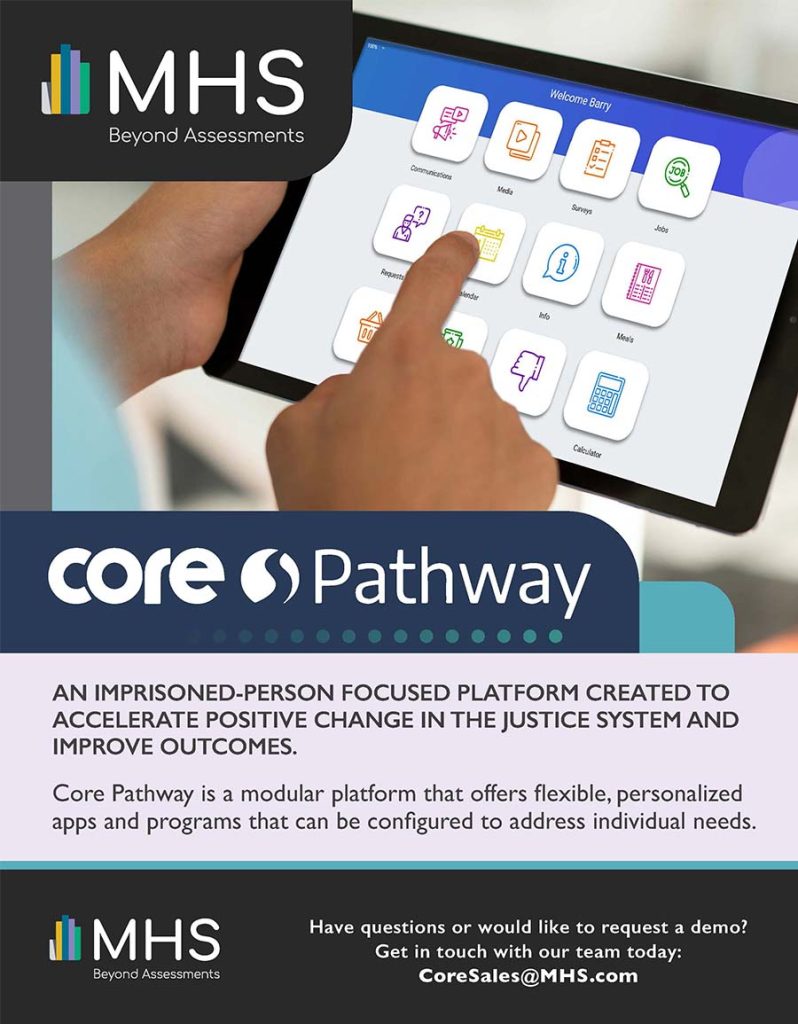Article
Colleen Walsh & Sarah Spence
There has been a paradigm shift towards a person-centric approach to rehabilitating and reintegrating individuals within correctional facilities and probation. This approach focuses on recognizing the intrinsic value of every individual involved in the criminal justice process. The foundation of this perspective lies in acknowledging a person’s dignity and potential to change.1
Increased digital and employability skills
A critical aspect of the person-centric approach involves leveraging technology to provide accessible and quality education to justice-involved individuals. Digital learning platforms offer diverse courses, from basic literacy to advanced vocational training.2 These initiatives cater to the educational requirements of justice-involved individuals and provide them with pertinent skills applicable in today’s employment landscape.3
An example is the work some correctional facilities in Finland are undertaking by offering justice-involved individuals a chance to contribute to a growing industry, Artificial Intelligence (AI).4 In this setup, justice-involved individuals are responsible for categorizing data gathered from online sources. Subsequently, this labelled data is utilized to refine an algorithm for database management, offering them opportunities for employment readiness. Upon release, initiatives like this enhance digital skills and offer justice-involved individuals a path to successful employment within the largest growing job sector.5
In New Zealand, one prison offers complete motor mechanical VR courses to justice-involved individuals, and early results have shown a significant boost in engagement. Large segments of imprisoned persons struggle with basic literacy. Inviting technologies to revolutionize the traditional education model will create an immersive and user-friendly learning experience, further fostering the rehabilitation of imprisoned persons and preparing them for release to a technologically advanced world.
Mental health and wellbeing
In a person-centric approach to mental health support for prisoners, technology serves as a transformative tool to address unique psychological challenges. Leveraging digital platforms, imprisoned persons can access remote mental health consultations, ensuring timely and confidential support from healthcare professionals.6
They can also access virtual therapy sessions facilitated through secure communication channels, creating a safe space for imprisoned persons to explore and manage their emotions.7 This integration of technology enhances accessibility to mental health resources and underscores the commitment to recognizing and addressing the individual needs of prisoners.
The same support can be offered to correctional officers and other personnel for a holistic person-centric approach. Online training can provide correctional staff insights into effective communication techniques, de-escalation strategies, and conflict-resolution methods. In England, services like Catch-22 work with all persons in the justice sector, including prison and probation officers, and provide CPD-certified social courses online.
Enhancing interpersonal skills contributes to a healthier work environment. It can alleviate mental strain, leaving time for positive and respectful interactions between staff and imprisoned persons, which sets the tone for a rehabilitative environment that fosters trust and cooperation.
Strengthened communications
Implementing person-centric communication platforms is crucial for modernizing prisons.8 These platforms can encourage meaningful connections between staff and imprisoned persons by facilitating secure and accessible communication, ensuring both parties can engage in open and respectful dialogue.
For staff, they can streamline administrative processes, enabling efficient information exchange and promoting a supportive work environment. Imprisoned persons can benefit from improved connectivity with their support networks, fostering emotional well-being and reduced feelings of isolation.
The person-centric model used to modernize prisons and probation recognizes each person’s intrinsic value and is essential for creating supportive environments and successful reintegration. The change towards this approach must include effective measures for mental well-being, communication, digital skill development, and education.
References
1 Zivanai, E., & Mahlangu, G. (2022). Digital prison rehabilitation and successful re-entry into a digital society: A systematic literature review on the new reality on prison rehabilitation. Cogent Social Sciences, 8(1)
2 O’Brien, K., King, H., Phillips, J., Dalton, K., & Phoenix. (2022). Education as the practice of freedom? – prison education and the pandemic. Educational Review, 74(3), 685-703.
3 Bhuller, M., Dahl, G. B., Løken, K. V., & Mogstad, M. (2020). Incarceration, recidivism, and employment. Journal of Political Economy, 128(4).
4 Chen, A. (2019, March 28). Inmates in Finland are training AI as part of prison labor. The Verge.
5 Indeed Editorial Team (n.d.). 11 of the fastest-growing industries to break into. Indeed
6 Domino, M. E., Gertner, A., Grabert, B., Cuddeback, G. S., Childers, T., & Morrissey, J. P. (2019). Do timely mental health services reduce re-incarceration among prison releasees with severe mental illness? Health Services Research, 54, 592-602.
7 Using virtual reality to improve inmate interaction with families. (2023, February 21). Corrections1.
8 Palmer, E. J., Hatcher, R. M., & Tonkin, M. J. (2020). Evaluation of digital technology in prisons.
Ministry of Justice Analytical Series.

Colleen Walsh is an accomplished and dedicated Product Owner with a strong background in the development and implementation of innovative software solutions, with the last 4 years focusing solely on Users in the Justice sector. With 8 years of experience in product innovation, Colleen understands the unique challenges faced by correctional facilities and translates them into effective software solutions. In her role as a Product Owner at Core Systems, Colleen is committed to driving innovation, improving operational efficiency, and ultimately contributing to the successful rehabilitation and reintegration of those in the justice system back into society.

Sarah Spence is a versatile Marketing Specialist at MHS, holding a Master’s degree in History with a focused research topic on domestic terrorism. Transitioning from a diverse background in B2B marketing, she now applies her expertise to deliver tailored solutions for the criminal justice sector. Sarah blends analytical insights with innovative marketing strategies, informed by her ongoing market research and awareness of technological advancements. Her meticulous approach ensures that marketing efforts align with overarching brand goals, leveraging data-driven insights to inform product development, contribute to thought leadership, and drive growth and engagement. Leveraging her strategic insight and deep understanding of industry trends, Sarah is well-positioned to be conducive to impactful growth strategies.



